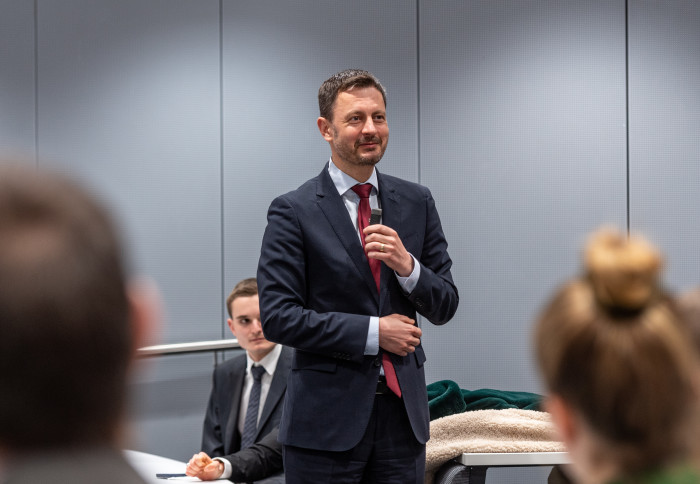Prime Minister of Slovakia meets student tech entrepreneurs at Imperial

The Prime Minister of Slovakia, Eduard Heger, met with Imperial students to discuss entrepreneurship, technology and innovation.
“The first way to success for a country is investment into education." Eduard Heger Prime Minister of Slovakia
The Prime Minister joined a session with students, alumni, industry professionals and tech entrepreneurs to hear about their innovative ideas, the lessons they have learned from studying in London, and how they could help drive the technology sector in Slovakia.
The Slovak Prime Minister was in London to meet with his UK counterpart Boris Johnson and other European leaders to discuss the crisis in Ukraine.
Speaking to the students, Prime Minister Heger said: “The first way to success for a country is investment into education. We can’t do anything else if we don’t invest in education, otherwise success will be smaller and slower, and we won’t reach the potential that we have.

“That’s why in the recovery plan that we developed, we chose two priorities for ourselves; education and health, because we want healthy people and we want smart people.”
Professor Francisco Veloso, Dean of Imperial College Business School, and Leila Guerra, Vice Dean (Education) at the Business School, hosted the Prime Minister, who was joined by the Ambassador of Slovakia to the UK, Robert Ondrejcsak.
The session included students from Imperial and other universities, and Slovak professionals from many industry sectors including finance, law, research, architecture, journalism or behavioural sciences.

Welcoming the Prime Minister, Professor Veloso highlighted the importance of investing in general science, education and innovation, during uncertain times, and urged students to be drivers of change to help improve society.
Professor Veloso said: “The way the world is going today, with intersections between business and technologies everywhere, I tell the students here to reflect on what’s happening around them, and what’s going to be their journey, their contribution, their drive, how they will change the world.
"Things are changing so fast, opportunities are there for anyone with the drive and capability to make a difference, that’s certainly true for an individual student, true for an institution, and true for a country.”

The event was organised by Imperial’s Czech and Slovak Society, which is chaired by Tomas Keblusek, and Imperial alum Miroslav Gasparek, President of University of Oxford’s Czech and Slovak Society.
Tomas Keblusek said: "During the discussion, a wide range of issues were raised from the nostrification of our university degrees to the bureaucracy connected with setting up companies in Slovakia.
"The prime minister seemed passionate about finding ways to remove these obstacles and attracting students and young professionals to Slovakia."

Imperial and Slovakia
Imperial has growing links with Slovakia and collaborates closely with top universities and institutes there such as Comenius University, Slovak Medical University, Slovak University of Technology and the Slovak Academy of Sciences.
Imperial has collaborated with Slovak partners on nine Horizon 2020 projects, funded by the European Commission. The most recent EU-funded project collaborations between Imperial and Slovakia have been in the areas of bioeconomy, trustworthy AI, and organic solar technology.
Imperial researchers has worked with Slovak academics on 64 co-authored publications in the last five years.
Imperial is also home to dozens of Slovak students and staff, and the Czech and Slovak student society has more than 30 members.
Article text (excluding photos or graphics) © Imperial College London.
Photos and graphics subject to third party copyright used with permission or © Imperial College London.
Reporter
Stephen Johns
Communications Division